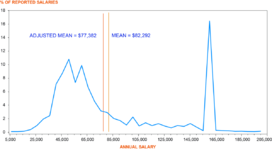I'm not even going to pretend I can be objective about student loans and what I think the government should do about them. All I have to peddle is my story.
I was lucky to finish my undergrad without any loans. This was due to several factors (first two years in a community college; a few years off to save money to finish my degree; never lived at a college/university campus). Unfortunately, my reward for all that was a generic, unemployable liberal arts major.
Even worse, I graduated in the spring of 2008. You may have heard stories about what happened to the U.S. economy around that time. Jobs were scarce, even if I had a more useful major (which I did not). I ended up working as an AmeriCorps volunteer for a couple of years. The stipend was meager (under $10K per year) but they did offer an extra $5k or so to go toward grad school.
Of course, you all know what happened next: I went to law school and in that process I amassed approximately $100,000 in debt. Then I passed the bar exam and started looking for work. I ended up at a small firm that offered base compensation of around $20,000, plus bonuses that never materialized.
A couple of small things broke my way. First, I never took out private loans. As a result, I qualify for income-based repayment plans. The upside is that my loan payments are limited to certain percentage of my income. The downside (there's always a downside!) is that over the past 7 years since I finished law school, my student loan payments covered
less than the amount of interest that accrues on those loans. My balance is now closer to $130,000 and growing, even though I've never missed a payment. There is effectively no chance that I will ever, ever, ever pay off what I owe.
Another benefit of only having government loans is that I may eventually qualify for PSLF (public service loan forgiveness) as long as I work full-time for a qualifying employer (usually a government entity or a nonprofit organization) for a period of 10 years. I am working my way towards that but still have 7-plus years to go.
If the nonprofit route fails, then I may still qualify for loan "forgiveness" after 20 years of timely payments. In this case, however, there is a reason for the quotation marks: the amount "forgiven" would be computed as taxable income, which could result in a tax bill in the tens of thousands of dollars (not exactly the kind of savings that rural nonprofit attorneys have).
To a certain extent, I get
@Tys1's point that my individual choices are what led me to this situation. On the other hand, I certainly did not expect, nor did anyone I spoke with ever mention, that there was a real likelihood that I would still be getting paid less than $40,000/year (after tax, but indulge me here) more than 7 years after graduation. And that's because the people who were advising me were themselves either private law school recruiters or out-of-touch boomers who had a much easier career path (lower education costs, comparatively higher pay... someone shared a cool graph several pages ago that illustrates this point perfectly).
In the end I feel both lucky and unlucky. Unlucky that I fell into a systemic trap; lucky that I at least got an education out of it, and now have a nonprofit job that makes a positive difference on other people's lives. I'll also tell you what I will
not feel: not even the slightest sense of guilt if/when my loans are eventually forgiven.

